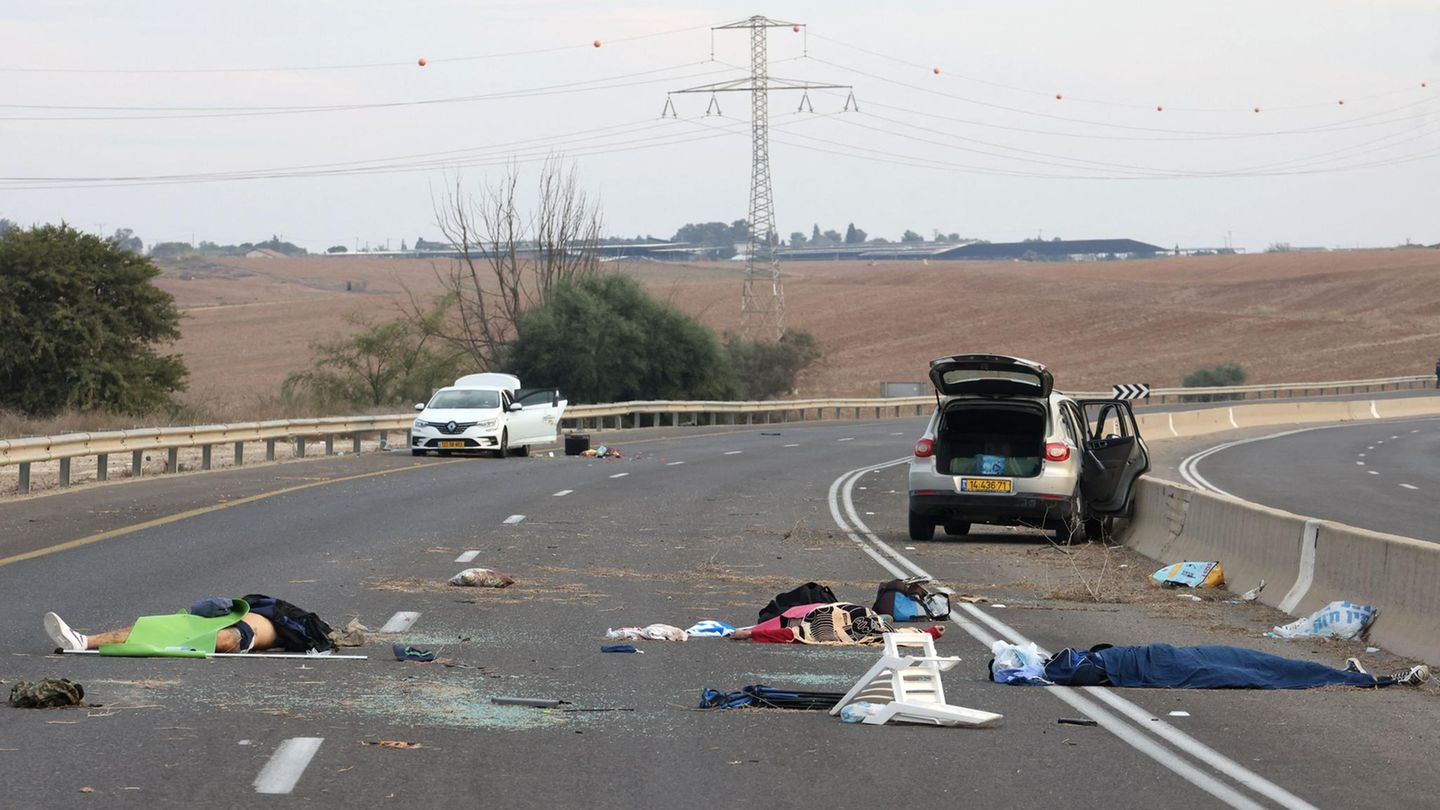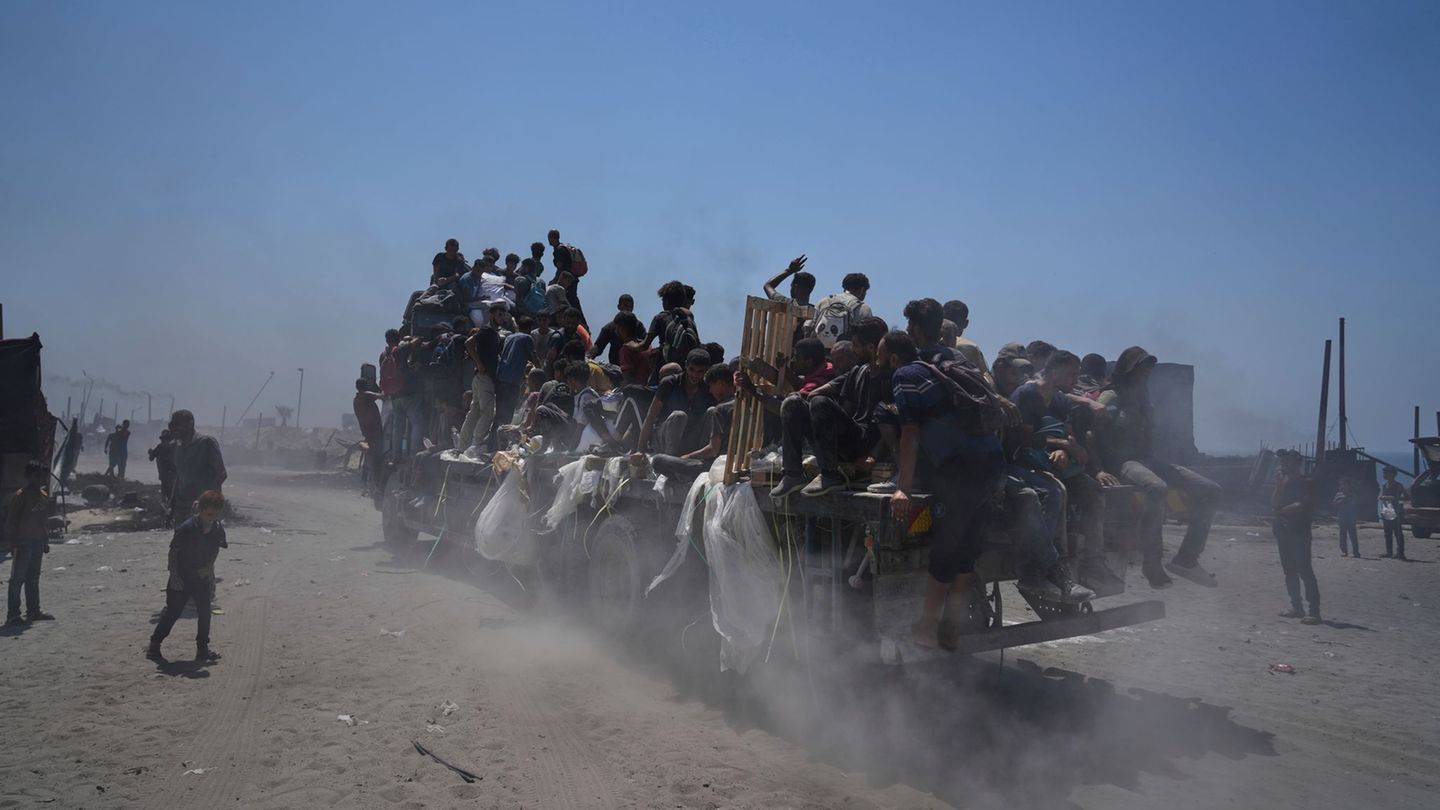Oded Bahar lives on a kibbutz near the Gaza Strip. Nurit Rosenfeld in the center of Tel Aviv. This is how the two experienced the day of horror when Hamas attacked Israel. Rosenfeld says: “There is no end to be seen on the horizon.”
Oded Bahar only had a few seconds left. The 69-year-old Israeli lives in Kibbutz Nir Yitzhak, just three kilometers from the border with the Gaza Strip. From there to his house the rockets never take more than a few moments. When Bahar heard the alarm on Saturday morning, he fled to the in-house shelter with Ofra, whom he calls the woman of his life. Ten hours later he wrote to this star: “We’re still in the shelter. I don’t know what’s going on outside.” He heard impacts, he heard shots. Like every Israeli his age, Bahar remembers many wars. He wrote: “This day reminds me what fear of death feels like.”
Nurit Rosenfeld didn’t go to bed until four in the morning; on Fridays she often stays in the kitchen until late at night, preparing food for Shabbat. At 6:30 a.m. the missile alarm woke them from their sleep. Nine hours later she texted him star: “We are still confused. I think of all those who are sitting in the shelters with their small children and cannot even go into the kitchen because there may be terrorists in the living room.”
Bahar and Rosenfeld don’t know each other, they live almost 100 kilometers apart, one in a rural kibbutz, the other in the metropolis of Tel Aviv, but since this Saturday, since October 7, 2023, they have shared a realization with millions of other Israelis . In Rosenfeld’s words: “We got caught with our pants down.” In Bahar’s words: “As far as the army is concerned – that would be worth a committee of inquiry.”
A day after Hamas’ surprise attack on Israel, many Israeli hostages are apparently still in the hands of Palestinian terrorists – a “substantial number,” according to the army. The hostages could be used as human shields or as leverage in negotiations; in 2011, more than 1,000 Palestinian prisoners were exchanged for a single Israeli soldier. Whether and when negotiations will take place is currently completely unclear. The suffering that Hamas has brought upon Israel is too great in just one day. The shame is too great.
A day they will never forget
The radical Islamic group Hamas, which controls the Gaza Strip, launched its surprise attack on Saturday morning around 6:30 a.m. with massive rocket fire. Thousands of projectiles rained down on Israel and temporarily overwhelmed the Iron Dome defense system. An unknown number of Palestinian attackers entered Israeli territory and took control of towns near the Gaza border. They had previously broken through the border fence, and some had apparently reached Israeli soil by paragliding or by boat. Numerous images of Israeli civilians being shot were circulating on social media. Israel declared a state of war and mobilized thousands of reservists. Over the course of the day, the army was able to liberate most of the towns.
By late evening, Israeli authorities reported 250 dead and 1,450 injured across the country. According to Palestinian information, the Israeli Air Force’s retaliatory strikes left 230 dead and 1,700 injured in Gaza.
Oded Bahar and Nurit Rosenfeld will probably never forget this day when Israel showed what it never wanted to show: weakness. Rosenfeld experienced this day from a distance, completely helpless. Bahar saw him up close, full of fear. Both were in frequent contact with the star throughout the day.
Bahar wrote in the afternoon that the kibbutz is a system that regulates all of life. On that day, however, all systems collapsed, especially his country’s security system. Bahar’s regular life was stripped of its regularity that day. Bahar wrote that his daughter and her three sons also live on the same kibbutz, as does his 93-year-old father. A family, a kibbutz. On this day: one family, three shelters. Whatsapp messages from bunker to bunker. And outside the rockets, the shots.
While Bahar sat in the shelter, Rosenfeld sat in front of the television. Saw footage of a man screaming for help. Who spoke of his wife and daughters who had been visiting their grandmother and called from the shelter and said they heard voices outside. Since then, the man has not been able to reach her, Rosenfeld wrote. But he found out that his wife’s cell phone was in Gaza.
“I hope that the situation gets back under control quickly,” wrote Rosenfeld. “But I also know that many people will only then receive the sad news that their loved ones are dead, wounded or captured.”
Bahar is a member of a discussion group that has met every Friday, on a hill near Sderot, from where the view extends to Gaza, at a disused sulfur factory that is sinking into the sandy ground. They sat there in the partial shade under sparse cedar trees and talked about the occupation and the blockade, and sometimes called Palestinian friends on the other side of the border. An exercise against forgetting.
State of war in the Middle East
Burning streets and people in fear – Hamas is attacking Israel
“There is no end in sight on the horizon.”
Bahar wrote from the shelter that the sun would shine again tomorrow, but his life would be different and the lives of many other people too. Perhaps, he wrote, even the lives of “all the people between the river and the sea,” meaning the Israelis, but also the Palestinians. Among the victims of this day lies the hope for peace.
Rosenfeld also has family on a kibbutz in the south, and her family also took refuge in shelters. Some, she wrote, only whispered on the phone to avoid being heard by the terrorists who might be hiding in the house. “They are afraid of ending up as hostages.” Her daughter was already at the airport on Saturday to fly to Germany. She didn’t board the plane. “I’m happy about it,” Rosenfeld wrote. “It’s unbearable to be away at times like these.”
She herself experienced the outbreak of the Six-Day War in 1967 while studying in Great Britain as a young woman. Horrible, but at least: Afterwards she strutted through foreign lands like a peacock, the whole world looked up to Israel, the quick victory made her proud.
It is not a given that victory will come quickly this time either. Or that it gives cause for pride.
It was only towards the evening that Bahar wrote that the army had the kibbutz back under control and was patrolling from house to house to escort the families out. Toilet, food, water. Five minutes. Then back to the bunker. Later that evening, the army gathered the kibbutz residents in a common room.
Oded Bahar and his wife Ofra stayed in the shelter for around 16 hours. 16 hours in which a war began outside that will change Israel.
Nurit Rosenfeld wrote about this war: “There is no end in sight on the horizon.”
Source: Stern
I have been working in the news industry for over 6 years, first as a reporter and now as an editor. I have covered politics extensively, and my work has appeared in major newspapers and online news outlets around the world. In addition to my writing, I also contribute regularly to 24 Hours World.




